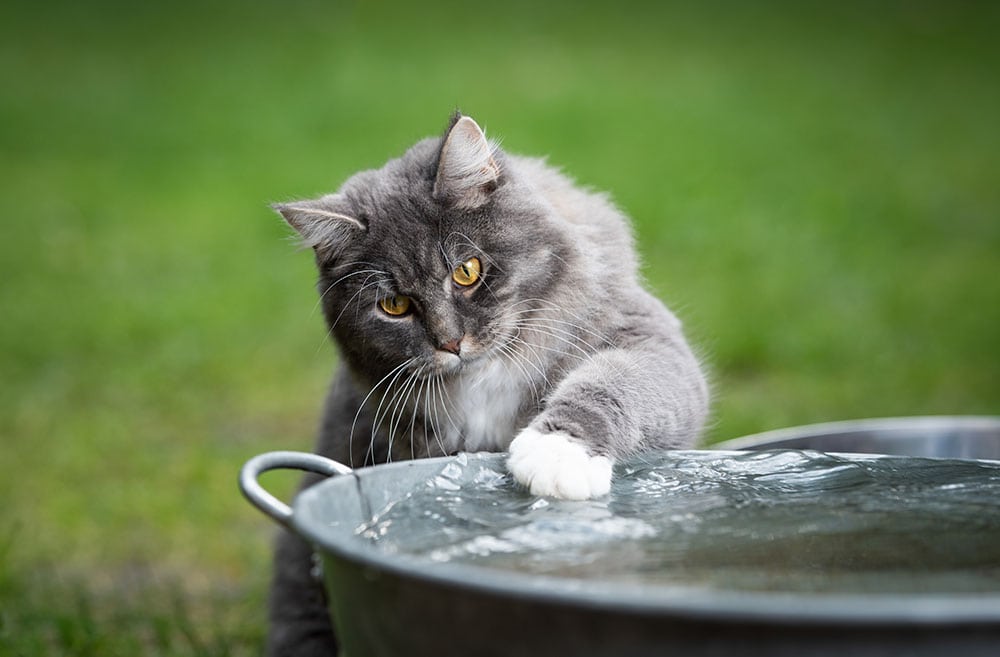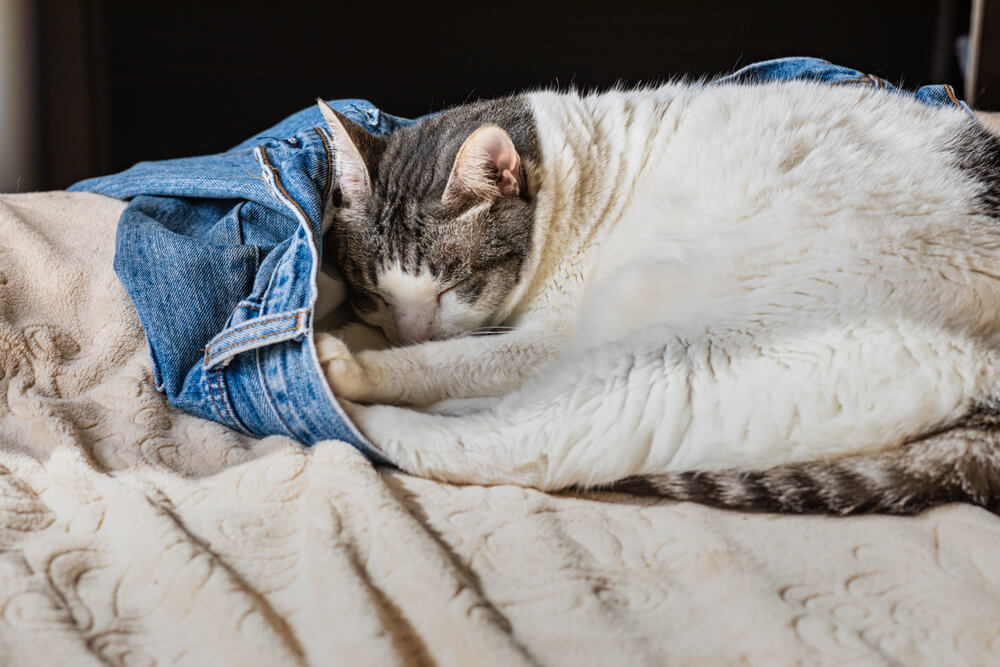Can Cats Eat Nuts? Vet-Reviewed Risks & FAQ
Updated on

Click to Skip Ahead
Many feline lovers and cat parents wonder if cats can enjoy the same treats we do. One might even ask: Can cats eat nuts?
In short, yes, cats can eat certain types of nuts. However, they are not ideal for a cat’s diet, and some even present a possible toxicity risk.
Let’s talk more about cats and their eating habits, including what can happen to cats if they eat nuts.
What Should a Healthy, Well-Balanced Cat Diet Look Like?
Cats need a healthy, well-balanced diet to properly develop, thrive, and get all the nutrients essential for maintaining a normal weight.
Since cats are obligate carnivores, their nutritional intake should include large amounts of animal protein, moderate fat, and minimal carbohydrates to stay in good shape and maintain optimum health. Cats also need to intake vitamins and minerals daily, and they can get all of these from commercial cat food or vet-approved home-cooked meals.
Most of the time, a high quality commercial cat food is the best choice for a well-balanced cat diet, as they contain the right balance of nutrients, and can be tailored to meet the needs of different ages, activity levels, and health conditions. It takes the hard work out of making sure your cat gets everything they need. Cats also require constant access to fresh water so they can freely hydrate throughout the day.
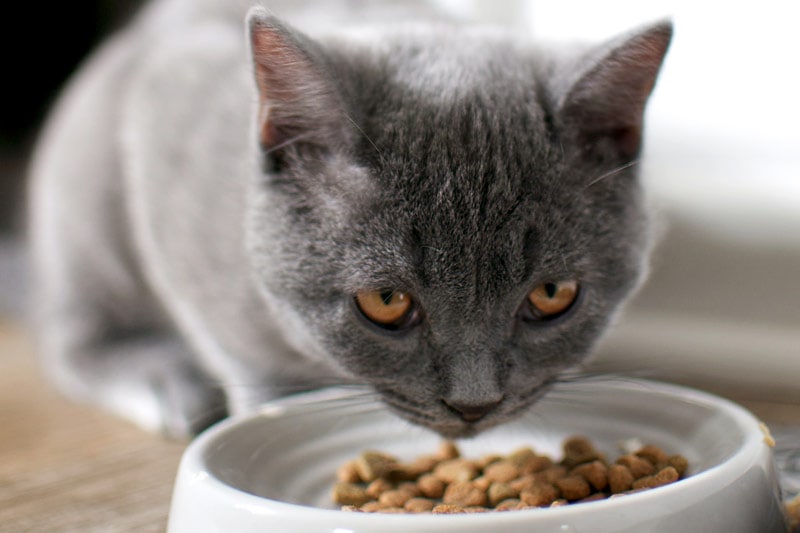
What Are Nuts?
When it comes to the botanical definition, a nut is a fruit that contains a single, edible seed (fruit composite) surrounded by a hard, single shell. In the culinary world, this term is used to describe all plants that have tender and oily flesh enclosed by a hard shell. Not all nuts are truly nuts; peanuts are legumes, for example, but to keep things simple, we will use ‘nuts’ in the general sense.
- Cashews
- Pistachios
- Macadamia nuts
- Walnuts
- Almonds
- Pecans
- Peanuts
- Brazil nuts
- Chestnuts
- Hazelnuts
These nuts are entirely safe for human consumption (with the exception of those with nut allergies, of course), but what would happen if our feline companions were to eat them?
Should Cats Eat Nuts? Are They Safe?
Cats can eat some nuts other than bitter almonds or macadamia nuts. That doesn’t necessarily mean they benefit cats. In fact, eating nuts can do more harm than good , which is why it’s best to avoid offering them to your furry friend. Some nut varieties are non-toxic to cats, which could categorize them as safe, but they contain large amounts of fat, which over time is not healthy. The hard shells can potentially cause problems such as choking or intestinal blockage.
Here is a list of the most common nut varieties, along with an explanation of how eating them can affect cats.
1. Almonds
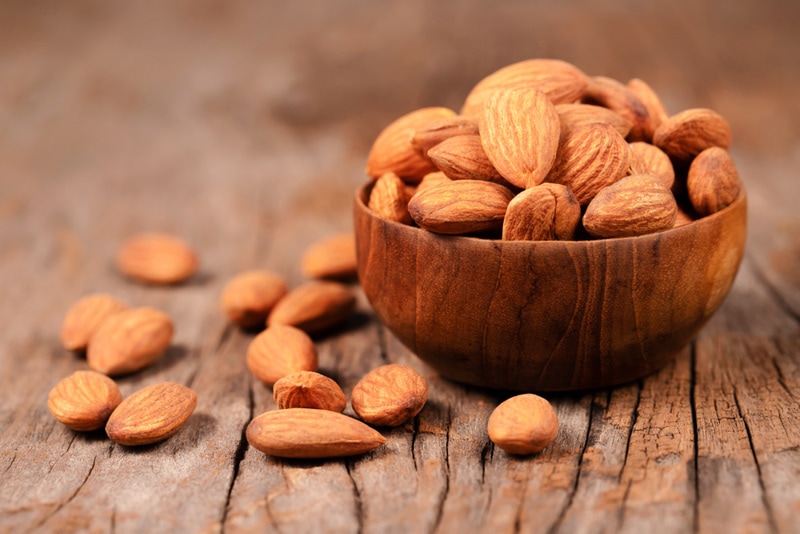
Although sweet almonds are not toxic to cats, they are high in fats, which could lead to gastrointestinal problems, such as stomach upset, abdominal pain, vomiting, and diarrhea. Due to their shape and size, almonds also pose a choking hazard, just like most other nuts do.
Bitter almonds, on the other hand, contain high levels of amygdalin 1, which, when broken down, becomes cyanide, a potent toxin that can affect all mammals, including cats. You should never offer your cat bitter almonds.
2. Cashews
Cashews are not known to be toxic to cats, but they are rich in fats, which is why it’s best to avoid offering them to your feline.
These nuts also pose a choking hazard, and eating them could result in gastrointestinal upset. If your feline friend really likes cashews, you can offer them on rare occasions and in small numbers. Just be aware that they won’t provide your cat with many nutritional benefits.
3. Chestnuts
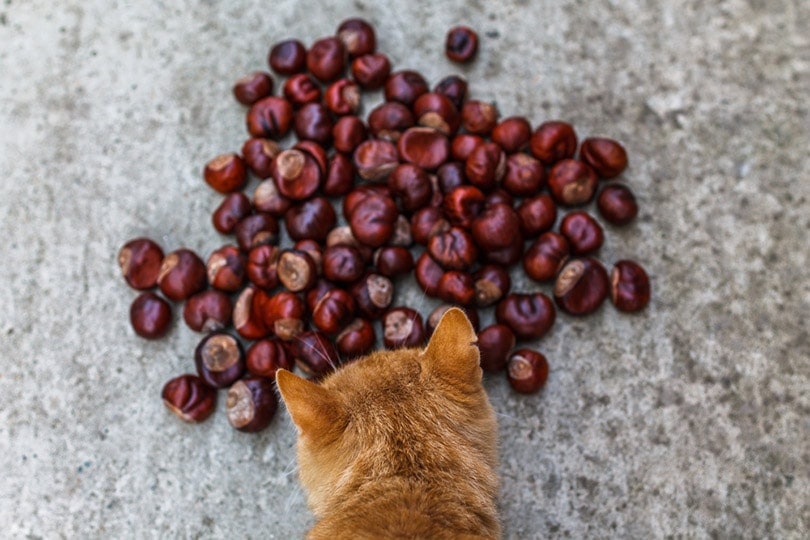
The chestnut is not toxic to cats, is low in fat, but high in carbohydrates, which should be limited in cats. They offer no nutritional value for our feline buddies.
4. Brazil Nuts
Brazil nuts are not known to be toxic to cats. Consuming Brazil nuts too frequently and in large quantities could cause harm to your cat’s health and lead to gastrointestinal upset.
5. Hazelnuts
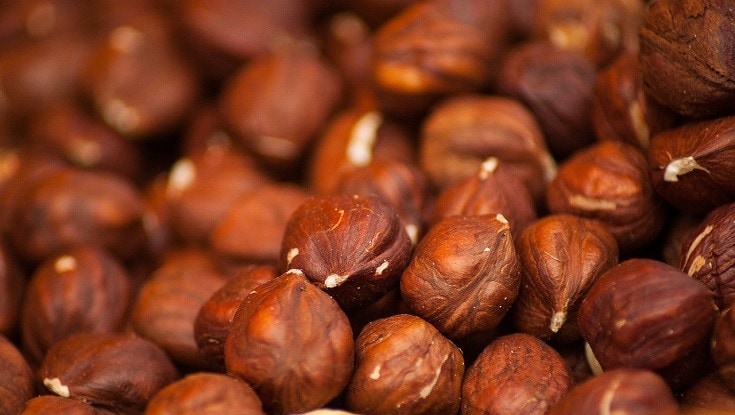
Hazelnuts are safe for cats but contain too much fat, which is why they should only be offered rarely and in small quantities. Due to their hard shell, hazelnuts can represent a serious choking hazard for cats, so be sure to monitor your feline while they’re eating them.
6. Walnuts
Walnuts are not toxic to cats, but they have questionable nutritional value. Eating a walnut or two shouldn’t do any harm to your kitty, though eating them too often could pose a health hazard due to their high fat content.
Another thing to be cautious about when offering walnuts to your cat is that you must ensure that they are fresh. Walnuts can quickly become moldy, and this mold sometimes contains harmful components called tremorgenic mycotoxins, which are toxic to cats.
- Panting
- Vomiting
- Excessive drooling
- Muscle tremors
- Restlessness
- Rapid breathing
- Rigid and stiff posture
- Increased heart rate
- Hypersensitivity
- Seizures
- Death
7. Macadamia Nuts

Macadamia nuts are known for being toxic to dogs, and while there’s no 100% proven evidence that they are harmful to cats, these nuts are also considered risky for any pet. It is possible no cat poisonings have been recorded because cats are unlikely to eat large amounts. In any case, never feed these nuts to your cat.
- Vomiting
- Diarrhea
- Lethargy
- Weakness
- Lack of coordination
- Trembling
- Collapse
Due to the possibility of toxicity, it’s best not to offer macadamia nuts to your cat.
What Are the Potential Health Risks of Cats Eating Nuts?
Weight Gain/Obesity
One of the biggest risks of cats eating nuts is weight gain and eventual obesity. Most nut varieties have high fat content and not enough of the nutrients that cats need to prosper and thrive. If cats consume them in large numbers, they could quickly gain weight, leading to obesity.
The high-fat content of nuts could also cause various gastrointestinal issues in your cat. Over time weight gain will increase their risk of debilitating diseases such as arthritis, diabetes and urinary problems.
Other Ingredients
Many store-bought nuts contain various spices, such as salt, onion, or garlic, that boost their flavor. However, these components can be toxic to cats and cause severe health problems.
If cats eat a very large amount of nuts that contain salt, they are at risk for salt toxicity, which can result in diarrhea, vomiting, lethargy, tremors and seizures in more severe cases.
Cats can also experience onion and garlic toxicity, so keep that in mind and ensure that the nuts that you consume or that you offer your cat are onion and garlic free. And of course, any nuts that are encased in chocolate are a definite no-no for your feline friend.
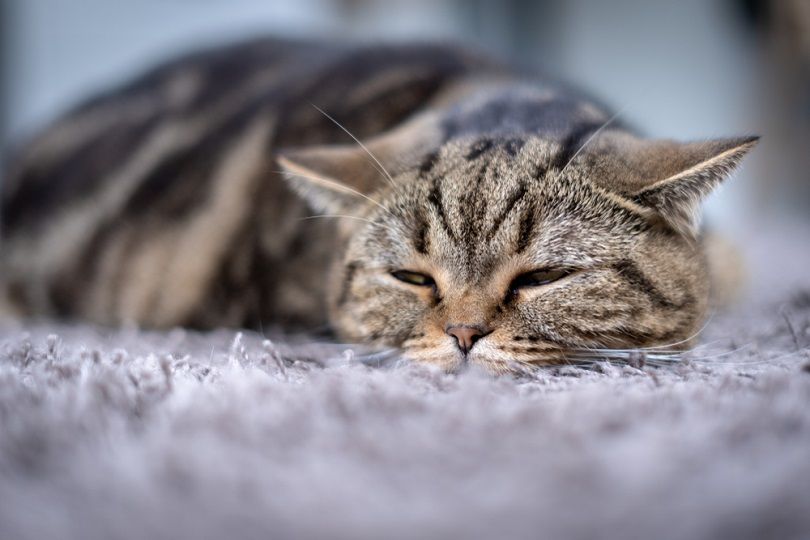
Choking
Being small and hard, nuts are one food item that a cat could potentially choke on. Although we don’t really recommend feeding nuts to your cat, if you do, make sure you are able to cut them into small pieces, and only every with the shell removed.
Allergy
Although peanut or tree nut allergy is not commonly recognized in cats, as a food that is a known allergen for humans, there is always the risk that some cats could also be allergic to nuts.
What Should I Do If My Cat Eats Nuts?
Eating a nut or two won’t necessarily kill your cat, but in excess, they can harm your pet’s health, so it’s important to know what to do if your cat eats nuts.
If you stick to these tips, your furry friend should be absolutely fine when and if they consume nuts:
- Read the label of the nut packing to ensure that there are no ingredients that are toxic to cats.
- Contact your veterinarian to get additional advice on the situation.
- Observe your feline for any signs of gastrointestinal upset or pain. If you notice any, immediately take your cat to the vet.
Never allow your cat to eat bitter almonds or macadamia nuts; they are believed to be toxic to felines. If your cat eats a bitter almond or macadamia nut, immediately speak to your vet.
Final Thoughts
With the exception of bitter almonds and macadamias, nuts are generally safe for cats. However, they are high in fat and don’t contain valuable nutrients for felines, which is why it’s best to keep them out of your cat’s diet.
Featured Image Credit: Towfiqu barbhuiya, Unsplash



